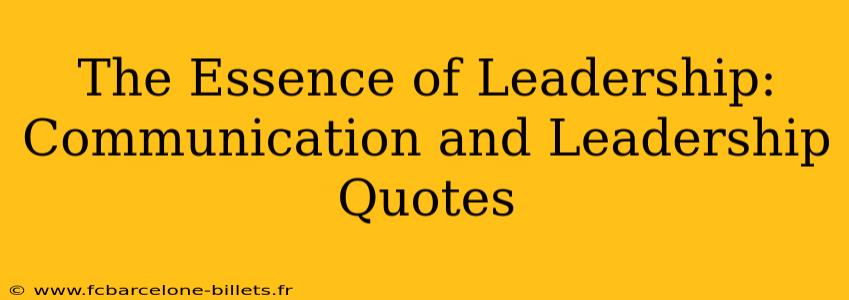Leadership is a multifaceted concept, but at its core lies the ability to communicate effectively and inspire others. Great leaders aren't just born; they are cultivated through experience, learning, and a deep understanding of human nature. Effective communication is the cornerstone of strong leadership, allowing for clear vision articulation, collaborative teamwork, and the fostering of a positive and productive work environment. This article will explore the crucial connection between communication and leadership, incorporating insightful leadership quotes that illuminate the path to successful leadership.
What is the importance of communication in leadership?
Effective communication is the lifeblood of any successful leadership endeavor. It's not simply about conveying information; it's about building relationships, inspiring action, and fostering a shared understanding of goals and values. Without clear communication, even the most brilliant strategy can falter. Leaders who can articulate their vision clearly, actively listen to their team, and provide constructive feedback create a culture of trust and mutual respect. This fosters collaboration, innovation, and ultimately, success. Conversely, poor communication can lead to misunderstandings, conflict, and decreased productivity. The ability to adapt communication style to different audiences and situations is also crucial for effective leadership.
How can leaders improve their communication skills?
Improving communication skills is an ongoing process that requires self-awareness, practice, and a willingness to learn. Leaders can enhance their communication prowess through several avenues:
-
Active Listening: Truly hearing and understanding what others are saying, both verbally and nonverbally, is paramount. This involves paying attention, asking clarifying questions, and reflecting back what's been heard to ensure understanding.
-
Clear and Concise Messaging: Avoiding jargon and ambiguity, and structuring messages logically, ensures that information is easily understood and retained.
-
Nonverbal Communication: Body language, tone of voice, and facial expressions significantly impact how messages are received. Leaders should be mindful of their nonverbal cues and ensure they align with their verbal communication.
-
Feedback and Open Dialogue: Creating a culture of open communication where team members feel comfortable expressing their opinions and concerns is essential. Providing constructive feedback regularly helps individuals grow and improve.
-
Empathy and Emotional Intelligence: Understanding and responding to the emotional needs of team members fosters trust and strengthens relationships.
What are some examples of effective communication in leadership?
Effective communication in leadership manifests in several ways:
-
Setting a clear vision: Leaders articulate a compelling vision that inspires and motivates their team. This vision should be clearly communicated through various channels and reinforced consistently.
-
Providing constructive feedback: Leaders offer specific, actionable feedback that helps team members improve their performance. This feedback should be delivered in a supportive and constructive manner, focusing on behavior rather than personal attributes.
-
Active listening and empathy: Leaders demonstrate genuine interest in their team members' perspectives and concerns, fostering a sense of trust and belonging.
-
Transparency and open communication: Leaders keep their team informed about important developments and openly address challenges and concerns.
What are some famous leadership quotes about communication?
Many renowned leaders have emphasized the importance of communication:
-
"The single biggest problem in communication is the illusion that it has taken place." - George Bernard Shaw: This quote highlights the importance of ensuring understanding and not just assuming it.
-
"Leadership is influence, nothing more, nothing less." - John C. Maxwell: Effective leadership relies heavily on influencing others, which requires strong communication skills.
-
"The key is not to prioritize what’s on your schedule, but to schedule your priorities." - Stephen Covey: This emphasizes the importance of clear communication of priorities and expectations within a team.
How can I improve my leadership communication?
Improving your leadership communication involves a multifaceted approach:
-
Seek Feedback: Ask for honest feedback from trusted colleagues and mentors on your communication style.
-
Practice Active Listening: Consciously work on actively listening during conversations, paying attention to both verbal and nonverbal cues.
-
Develop Empathy: Strive to understand the perspectives and emotions of others.
-
Read Widely: Explore books and articles on communication and leadership to expand your knowledge and understanding.
-
Take Courses: Consider taking courses or workshops focused on communication and leadership skills.
In conclusion, effective communication is the bedrock of successful leadership. By actively developing and refining communication skills, leaders can build strong teams, achieve shared goals, and create a positive and productive work environment. The quotes highlighted above serve as reminders of the vital role communication plays in the essence of leadership. Continual self-assessment and a commitment to improvement are essential for any aspiring or established leader seeking to enhance their communication and ultimately their leadership capabilities.

